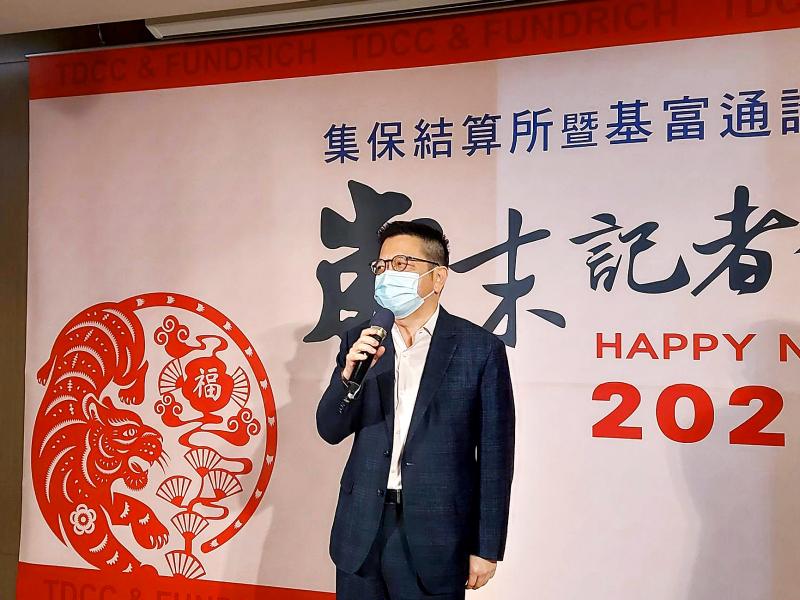Publicly listed companies are to be able to choose whether to hold annual shareholders’ meetings entirely or partly by videoconference, the Taiwan Depository and Clearing Corp (TDCC, 台灣集中保管結算所) said yesterday.
Although the COVID-19 pandemic has limited public gatherings since the beginning of 2020, listed companies have not been allowed to hold annual shareholders’ meetings completely over videoconference, partially due to regulators’ concerns over cybersecurity and protecting shareholders’ interests.
As regulations have been amended to allow for virtual shareholders’ conferences, the TDCC is altering its information system to facilitate videoconferencing of shareholders’ meetings this year, chairman Sherman Lin (林修銘) told a news conference in Taipei.

Photo: Chen Yung-chi, Taipei Times
“It is possible that we will see two ways in which a shareholders’ meeting is held this year — a company should be able to choose whether it wants a pure virtual meeting, or hold a physical meeting while allowing some shareholders to attend through a videoconferencing tool,” Lin said.
The rules set by the Financial Supervisory Commission would regulate what kind of companies are eligible to convene shareholders’ meetings virtually, Lin added.
Companies that plan to have crucial shareholders proposals addressed at their meetings, such as those involving management disputes, would likely be barred from holding such a meeting entirely over videoconference to prevent controversy, the agency said.
Seventeen companies held physical meetings while allowing virtual attendance last year, compared with 1,744 public companies that could not, agency data showed.
More companies are expected to employ videoconferencing tools to hold virtual meetings as a supplement to in-person meetings this year, the agency said.
Amendments to the Company Act (公司法) passed last month enable private companies to freely convene shareholders’ meetings completely by videoconferencing from this year, but impose more rules on public companies to ensure shareholders’ rights are preserved.
The commission plans in March to unveil new rules regulating how public companies hold virtual shareholders’ meetings.
TDCC yesterday reported a record net profit of NT$6 billion for last year, with earnings totaling NT$13 per share, and its FundRich Securities Co Ltd (基富通) unit moved into the black, recording net profit of NT$130 million, it said.

Application-specific integrated circuit designer Faraday Technology Corp (智原) yesterday said that although revenue this quarter would decline 30 percent from last quarter, it retained its full-year forecast of revenue growth of 100 percent. The company attributed the quarterly drop to a slowdown in customers’ production of chips using Faraday’s advanced packaging technology. The company is still confident about its revenue growth this year, given its strong “design-win” — or the projects it won to help customers design their chips, Faraday president Steve Wang (王國雍) told an online earnings conference. “The design-win this year is better than we expected. We believe we will win

Intel Corp chief executive officer Lip-Bu Tan (陳立武) is expected to meet with Taiwanese suppliers next month in conjunction with the opening of the Computex Taipei trade show, supply chain sources said on Monday. The visit, the first for Tan to Taiwan since assuming his new post last month, would be aimed at enhancing Intel’s ties with suppliers in Taiwan as he attempts to help turn around the struggling US chipmaker, the sources said. Tan is to hold a banquet to celebrate Intel’s 40-year presence in Taiwan before Computex opens on May 20 and invite dozens of Taiwanese suppliers to exchange views

Chizuko Kimura has become the first female sushi chef in the world to win a Michelin star, fulfilling a promise she made to her dying husband to continue his legacy. The 54-year-old Japanese chef regained the Michelin star her late husband, Shunei Kimura, won three years ago for their Sushi Shunei restaurant in Paris. For Shunei Kimura, the star was a dream come true. However, the joy was short-lived. He died from cancer just three months later in June 2022. He was 65. The following year, the restaurant in the heart of Montmartre lost its star rating. Chizuko Kimura insisted that the new star is still down

While China’s leaders use their economic and political might to fight US President Donald Trump’s trade war “to the end,” its army of social media soldiers are embarking on a more humorous campaign online. Trump’s tariff blitz has seen Washington and Beijing impose eye-watering duties on imports from the other, fanning a standoff between the economic superpowers that has sparked global recession fears and sent markets into a tailspin. Trump says his policy is a response to years of being “ripped off” by other countries and aims to bring manufacturing to the US, forcing companies to employ US workers. However, China’s online warriors